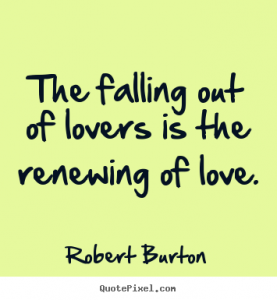Have You Fallen Out of Love?
 Love: the word means different things to different people—and different things to the same person at different times.
Love: the word means different things to different people—and different things to the same person at different times.
What’s in a word? Here are some meanings of “love:”
- Erotic love. We all know what this one means. It’s what we mean when we say we’re “in love.” It’s “I want to have your babies”–or sometimes just “I want to have your body.” It also tends to burn out over time.
- Maternal love. This one involves tenderness of the heart and the instinct to protect.
- Spiritual love. This isn’t directed at one person: it’s directed toward all people. The Greek word for this was agape.
- Deep affection and caring. Does this qualify as “love?” Absolutely. Lovely doesn’t have to be passionate. It can be quiet. It can be enduring. It can be deep.
In our culture, we tend to establish long-term relationships with people based on erotic attraction. Those eyes across the crowded room. That dynamite connection.
In many ways, this is a fine thing. Yet it also can create problems down the road. When “in-loveness” burns out, many people assume, logically enough, that they’ve “fallen out of love.” And then they start wondering if the relationship is right for them.
Not so fast, Ms. (or Mr.) Lonelyheart.
Here’s an alternative framing: maybe you’ve just switched categories of love.
Assuming your partner is a worthy person, the passionate feelings you had initially may have been transformed into deep affection and caring. You’ve become attached—connected at a very deep level.
Is this enough for you? That depends. If you’ve bought into our cultural version of love’s “true meaning”—or maybe we should refer instead to our cultural version of “true love’s meaning”—then you might feel that loving, rather than being in love, isn’t enough. If you think you should be in love—if you think you have a right to be in love—then simply feeling deeply connected to another person won’t be enough.
There’s another factor, too. We all have competing desires for attachment and autonomy. Sometimes our hankering for autonomy causes us to resent our deep attachments. When you’re feeling really bonded, it’s easy to feel you’re in bondage—and not in a good way.
Attachment isn’t easy. Attachment is—well, it’s sort of the Middle Earth of love. It’s got its ups and downs, in no small matter because, more often than not, you’re seeing your partner as he or she really is, without the projections that passion brings. Look at it this way: it’s a lot more difficult to love a wart than a fantasy.
Attachment is to sobriety what being in love is to intoxication. It inhabits the reality realm—and the reality realm, as we all know, is a mixed blessing.
Still, it’s important not to overlook the positives. The next time you’re feeling down because things aren’t as passionate as they used to be, take a deep breath and ask yourself these questions:
- Do I not love my partner any more, or is just a different flavor of love?
- What rewards do I get in having this person in my life to whom I feel so attached?
These questions may aggravate your discontent, and then again they may not. They may get you feeling grateful—and take the edge off the painful truth that, at the end of the day, we’re all citizens of Middle Earth.



Leave a Reply
Want to join the discussion?Feel free to contribute!